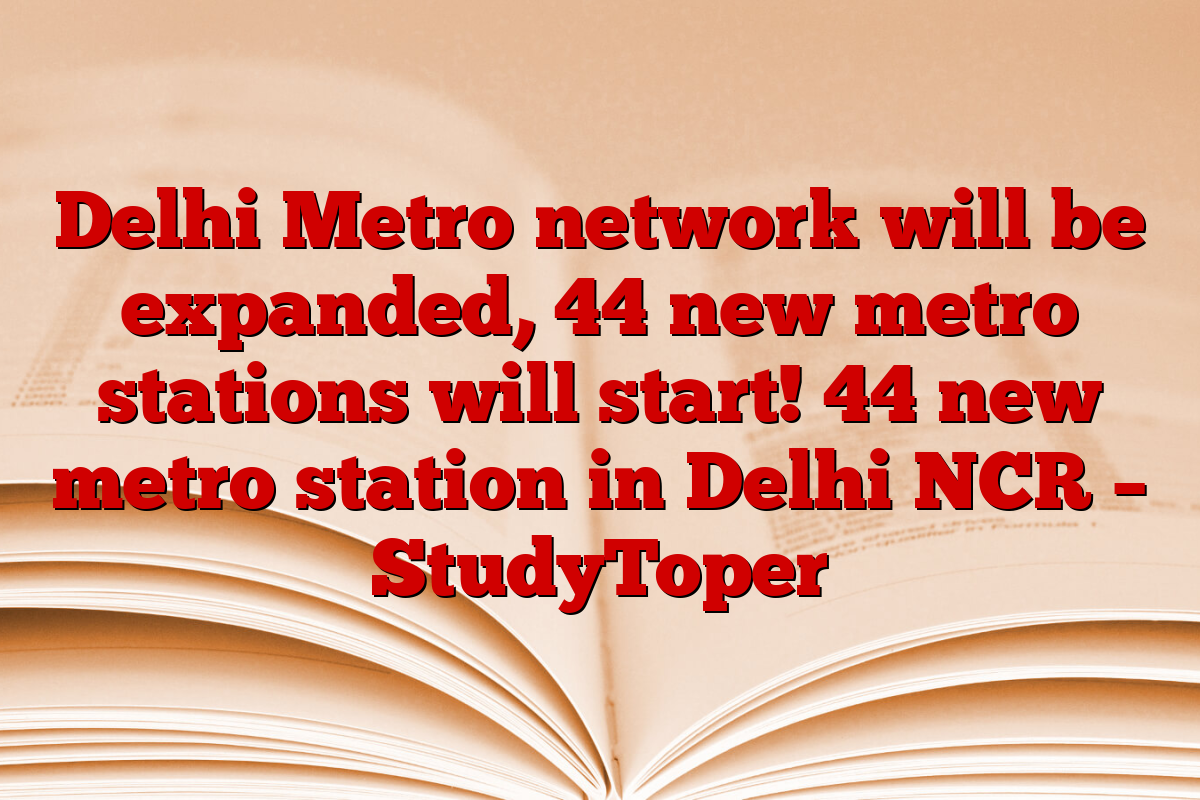Delhi Metro has become the most important transport means of the country’s capital. It not only allows millions of passengers to travel daily, but also helps in reducing traffic jams and pollution. Now there is going to be a big expansion in the network of Delhi Metro, which will provide even better facilities to the passengers. Under this expansion, 44 new metro stations will be built, which will connect Delhi and surrounding areas. The project is a great news for the people of Delhi-NCR.
In this article, we will tell you in detail what is this Delhi Metro Extension Scheme, which new stations will be built under it, what is the purpose of this scheme and what are the benefits of the general public. Let’s know every information related to this project.
Delhi Metro Extension Scheme: Chief Information
This new expansion phase of Delhi Metro is designed to connect Delhi and NCR region more efficiently. Many new lines and stations will be added under this project. Below is a summary of this scheme through a table:
| Name of the scheme | Delhi Metro Extension Scheme 2023-24 |
| Total new stations | 44 |
| Total distance (km) | About 62 km |
| key areas | Delhi, Noida, Gurugram, Faridabad |
| Cost of scheme | ₹ 10,000 Crore (Estimated) |
| construction period | 2023-2026 |
| key benefits | Better connectivity, time savings |
| Project management | Delhi Metro Rail Corporation (DMRC) |
List of 44 new metro stations and their importance
44 new stations will be built under this project. These stations are being built in areas where there was no metro facility yet or where the number of passengers is increasing rapidly. These stations will benefit from not only Delhi but also other cities of NCR like Noida, Gurugram and Faridabad.
Major Station:
- Dwarka Extension
- Rohini Sector 28
- Noida Sector 143
- Gurugram Sector 56
- Faridabad Old Town
- Kashmiri Gate Interchange
Importance of these stations:
- Better connectivity: These new stations will add areas where there was still a shortage of public transport.
- Travel time will be short: New lines will help avoid traffic jams.
- Economic Development: Trade and employment opportunities will increase in these areas.
The purpose of this expansion plan
The main objective of the Delhi Metro Extension Scheme is to improve the traffic system in the capital region and provide better facilities to the people. In addition, this plan focuses on the following objectives:
- Environmental protection: Promoting public transport to reduce pollution.
- Travel facility: Providing fast, safe and comfortable journey to passengers.
- Reducing traffic jams: Reducing pressure on road traffic.
- Development of NCR region: To add Delhi as well as NCR region.
Project cost and construction process
The project will cost an estimated ₹ 10,000 crore. This amount will be borne by the Central Government, State Government and private investors. Construction work will be completed in three stages:
- First Phase (2023-2024): Preparation of primary survey and design.
- Second phase (2024-2025): Starting construction work.
- Third phase (2025-2026): to start testing and operation.
Benefits from Delhi Metro Extension Scheme
This scheme will be beneficial not only for passengers but for the whole society. The following are some of its major advantages:
- Time Saving: New lines will reduce travel time.
- Low spent: Metro travel will be cheaper than private vehicles.
- Safe travel: Metro travel is more secure than road accidents.
- Environmental protection: The use of electric trains will reduce pollution.
- Economic Development: New lines will increase trade and employment opportunities.
Challenges and solutions
Although this project is extremely ambitious, it also has some challenges:
Challenges:
- Land acquisition delay.
- Traffic affects from construction work.
- The risk of increasing cost.
Solution:
- The government has to complete the land acquisition process rapidly.
- Construction work at night or in non-non-hours.
- Keep strict monitoring for cost control.
future plans
Delhi Metro Rail Corporation (DMRC) has also made several plans in future. These include expansion of metro service to other cities like Meerut, Panipat etc. In addition, additional trains will be run to reduce congestion on existing lines.
conclusion
Delhi Metro Extension Scheme is an important step in the development of the capital region. This will not only provide better facilities to the passengers but will also contribute to environmental protection and economic development. Although the government and concerned agencies will have to face many challenges to make this project a success, but its benefits are more than these challenges.
Disclaimer:
This article is based on available information. If there is any official announcement or update related to this scheme, it should be carefully checked. At present, this plan seems real but it is necessary to monitor the process of implementing it.
